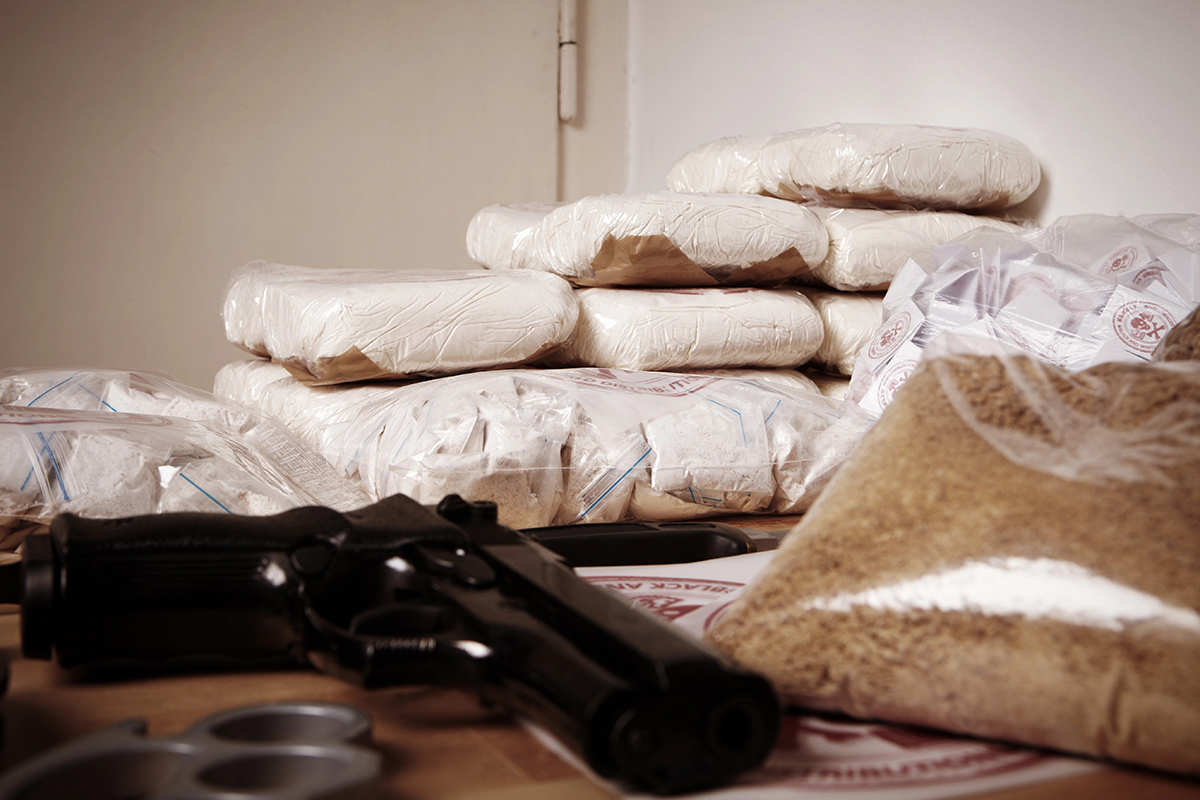If you are facing drug trafficking charges, you need a criminal defence lawyer in Calgary to look at your case as soon as possible.
Drug trafficking involves selling, giving, transporting, sending, or delivering illegal drugs to others.
According to Section 5(1) of the Controlled Drugs and Substances Act, “No person shall traffic in a substance included in Schedule I, II, III, IV or V or in any substance represented or held out by that person to be such a substance.”
Drug trafficking is classified as a hybrid offence. This means the Crown can choose to proceed either by indictment (for more serious cases) or by summary conviction (for less serious cases).
The penalties for drug trafficking in Canada are severe.
- If prosecuted by indictment, trafficking in Schedule I or II drugs can result in imprisonment for life.
- For Schedule III drugs (like LSD or psilocybin), the maximum penalty is 10 years in prison if prosecuted by indictment.
- For Schedule IV drugs (like prescription medications), the maximum is 3 years imprisonment.
- The court may also impose significant fines in addition to imprisonment, particularly in cases involving commercial drug operations. For matters related to fines, you might also consider exploring options with our Fine Lawyers Calgary.
Strategic Criminal Defence is a top Google-rated criminal defence firm in Calgary, with over 500 5-star reviews. Our firm, and our experienced legal team, have defended clients in over 10,000 criminal cases. Leveraging our extensive network of lawyers and decades of experience, we craft defence strategies to help those accused of drug trafficking beat the charge.
The lawyers at Strategic Criminal Defence are both highly experienced and dedicated to defending your rights and future in the face of these charges. Contact a lawyer today by calling (403) 719-6410 or visit our Contact Us page.
Key Takeaways
- Drug trafficking is when you give, send, deliver, or move illegal drugs. It’s one of the most serious drug crimes in Canada.
- If you are caught selling Schedule I drugs (like cocaine, heroin, or fentanyl) or Schedule II drugs, you could spend the rest of your life in prison.
- If there is proof that someone meant to sell drugs, like having a lot of small packages of drugs or digital scales, even small amounts can be seen as trafficking.
- If you are charged with trafficking, your bail conditions are usually very strict. They could include house arrest, curfews, not being able to talk to other people who are also charged, and not being able to use cell phones.
- You might be able to defend against a trafficking case by arguing that the searches were against the law, that you didn’t know about or have control over the drugs, or that the proof of actual trafficking isn’t strong enough.
How Our Lawyers Help With a Drug Trafficking Charge
A Strategic Criminal Defence lawyer can help you if you are facing these serious charges.
- Our team can help you not say things unnecessarily that the police could use against you later on in your case.
- Our lawyers can help collect evidence that backs up your case. Such as, surveillance videos that show police accounts of drug deals that don’t match up or electronic records that show where you get your money. We could hire experts, like forensic toxicologists, to find out how drugs are weighed or identified, or experts to find out how to read text messages.
- Our team knows exactly what the Crown needs to show to get trafficking charges, such as knowledge, control, and the plan to sell. We can help you with the court process in Calgary and may even work to have the charges dropped.
Examples of Drug Trafficking Charges
Here are some examples of what could lead to drug trafficking charges in Calgary:
- A college student is caught at a party selling small bags of cocaine to other students. The police find $500 in cash and text messages on his phone that set up sales. He only had 10 grams of cocaine, but the text messages and proof of sales led to trafficking charges instead of just possession.
- Over several hours, police see a woman meet with a few people in a park. When they take her into custody, they find evidence such as 20 small bags of meth, a digital scale, and $1,200 in small bills.
- The police stopped a package sent to a man’s house with 500 MDMA (ecstasy) pills in it after looking into some strange package deliveries. They do a “controlled delivery,” which means they let him take the package and then arrest him. There is evidence on his computer that he bought things on the dark web and talked about how to sell drugs. He is accused of both bringing in and selling an illegal drug.
Consequences of a Drug Trafficking Charge
Typically, if you are found guilty of drug trafficking, you can expect much harsher penalties than with a drug possession charge.
The prosecution will seek jail time in all but the least serious cases (no Conditional Sentence Orders – aka “house arrest”).
For a conviction, your sentence will depend in part on:
- What type of substance you were found guilty of trafficking
- The quantity of drugs trafficked
- The number of drug deals you were involved in
- What other offences were committed at the time
- Prior related offences
If you are found guilty of trafficking any of the following “hard drugs” (those listed in Schedule I or II), you could get a life sentence:
- Cocaine
- Marijuana or cannabis resin (hashish) over 3 kgs (up to five years for an amount under 3 kgs)
- Heroin
- Morphine
- Opium
- OxyContin
- Codeine
- Fentanyl
- GHB
Although the above are the most common, there are many more drug types listed in Schedule I and II. It is important to review carefully what type of drug is involved in your case to determine the possible sentence you may be facing if convicted. You may also want to review our criminal sentencing guidelines in Calgary to better understand potential outcomes.
Additionally, a mandatory minimum sentence of one year may apply if the trafficking offence involved:
- Organized crime, or a criminal organization as defined under section 467.1(1) of the Criminal Code
- Use or threat of violence
- Possession, use, or threat of use of a weapon
- A prior conviction for a similar offence in the previous 10 years
A mandatory sentence of two years may apply if your offence was committed:
- In or near a school, playground, or other public place frequented by children
- In a prison; or
- With the help of a child
Even if you were found guilty of trafficking “lower grade” drugs (those listed in Schedule III or IV), you could receive a sentence of up to 10 years in jail.
The prospect of such harsh penalties makes it critical to have a dedicated and experienced drug trafficking lawyer to defend you from as early as possible in your case.
Drug Trafficking Charge Defences
Defences usually ask how the evidence was gathered, show that the person didn’t know about or have control over the drugs, or show that the drugs were for personal use and not for sale.
Here are some of the most common defences:
- Charter: If the police searched you, your car, or your home without a valid warrant or good reason, they might not be able to use any evidence they found in court. In such situations, our team can also offer pre-charge legal advice in Calgary to help protect your rights from the outset.
- Not Knowing/In Control: To get a trafficking conviction, the Crown must show that you knew you had the drugs and were in control of them. This could be a defence in a lot of cases where drugs were found in places that were shared. If drugs were found in a car, apartment, or business that you shared with someone else, maybe you didn’t know they were there. This defence is especially useful when a lot of people can easily get to the drugs.
- Identity: In drug trafficking cases where surveillance or undercover work is used, identity can be very important. Police might keep an eye on a house they think is a drug house, see what they think are drug deals going on there, and then arrest someone they think was involved. We can ask if the police were right to say that you were involved in any drug deals that were reported. This defence works best when people can see quick hand-to-hand transactions from a distance, at night, or in busy places.
Drug Trafficking Charge Investigation
- When it comes to street-level trafficking, police often start by watching people they think are dealers.
- They could have officers in plain clothes watch people buy and sell things, or they could have undercover officers make controlled buys, which means they buy drugs directly from people they think are guilty. T
- hey keep careful records of these purchases, sometimes with audio or video recording equipment, and they keep the drugs that were bought as proof.
- Police can use secret informants, wiretaps on phones with a judge’s permission, and watch suspected stash houses for bigger operations.
- When police look into drug trafficking online, they keep an eye on darknet marketplaces. They may set up fake accounts to buy things. When drugs come into the country, they work with border services.
- Before making an arrest, investigators often search homes, cars, or businesses with search warrants. They look for drugs, money, scales, packaging materials, lists of debts, more than one phone, and weapons during these searches. All of these things point to trafficking.
Bail Conditions for Drug trafficking Charges
If you are accused of drug trafficking, the court will likely set strict bail conditions while you wait for your trial.
- You will not be allowed to own or use any drugs or drug paraphernalia.
- Without a court order, you likely won’t be allowed to own any weapons.
- You might have to stay home or be home by a certain time. Often you can only leave your house for certain reasons, like going to work, a doctor’s appointment, or a legal appointment. You might even have to wear an electronic ankle bracelet that tells the court where you are at all times.
- You likely won’t be able to go to places where drugs are sold or where you were said to have sold drugs.
- You can’t talk to anyone else who is being charged with the same crime as you or anyone who is a witness in your case.
- You will have to check in with a bail supervisor or police station on a regular basis.
If you break any of these rules, you could be arrested right away. You might lose your bail and have to stay in jail until your trial is over. If you break the terms of your bail, you could also be charged with more crimes. These charges come with their own punishments.
For more information, visit our page on The Bail Hearing Process in Calgary.








